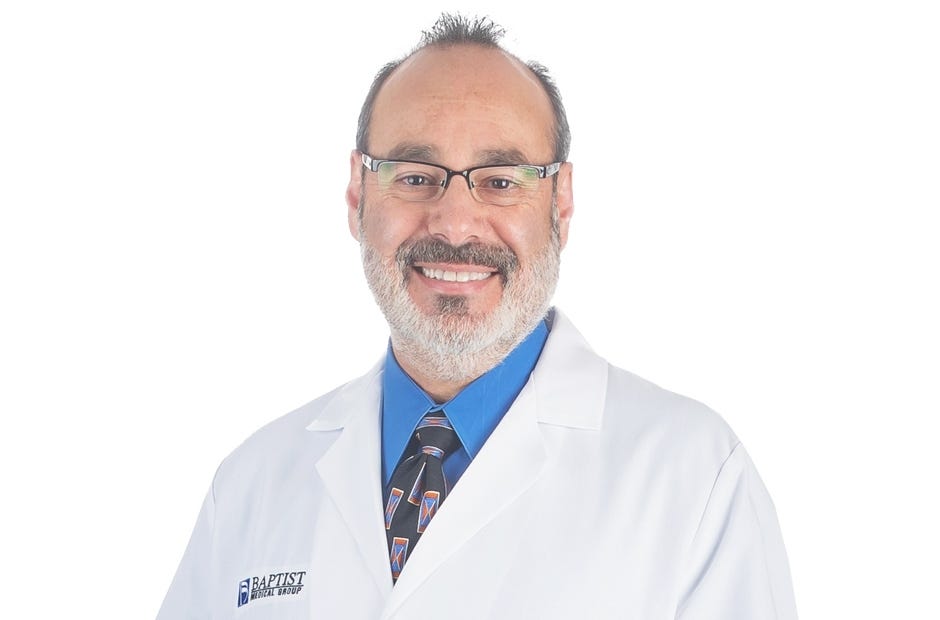
March is National Colon Cancer Awareness month. Colorectal cancer is the third most common cancer diagnosed in men and women in the U.S. However, many colorectal cancers can be prevented through regular screening.
Here, Dr. Marc Saunders, a board-certified general surgeon with Baptist Medical Group, answers questions about the importance of colorectal screening.
“As the son of a father who developed colon cancer, I feel it's vitally important for everyone to have regular colorectal cancer screenings,” Saunders said.
That includes not only people at high risk for colorectal cancer, but also the average person at normal risk.
Here is a Q&A with Saunders.
What is colorectal cancer?
Most colorectal cancers are … cancers that begin in cells that make and release mucus and other fluids. Colorectal cancer often begins as a growth called a polyp, which may form on the inner wall of the colon or rectum. Certain polyps have a greater risk of turning into cancer as they grow. These are called adenomas.
What is the best way to test for colon cancer?
A colonoscopy is the best test because the lining of the colon and rectum is visualized. Then polyps can either be entirely removed or biopsied and their positions marked in case surgery is needed later on.
Fortunately, colonoscopy is well tolerated by most patients of all ages. In a nutshell, colorectal cancer screening is about finding and removing any growths so that they can't develop into cancer later on.
At what age should men and women be screened? How often?
Age 50 for men and women at an average risk for colon cancer.
Get screened every 10 years between ages 50 and 80 unless there are changes in bowel habits, rectal bleeding, unexplained weight loss or abdominal pain; then screenings should be done more frequently.
High-risk patients should be screened 10 years before the age of diagnosis of their relative with colon cancer.
Who is at a high risk of developing colon cancer?
High-risk patients are those with a strong family history of colon cancer or hereditary polyp syndromes, or those with inflammatory bowel disease such as Crohn's disease or ulcerative colitis; the screening needs to be done more frequently. If a patient is found to have polyps that are benign, but are possible precursors to colon cancer, the frequency of screening is increased.
What are the symptoms of colon cancer?
Symptoms may include rectal bleeding, unexplained weight loss, change in bowel habits, decreased stool caliber or signs of bowel obstruction like abdominal bloating and vomiting, if the cancer is advanced. Patients may not experience symptoms until the disease has progressed.
How is colon cancer treated? What are the chances it will return?
When colorectal cancer is found, a number of tests are done to see if there is evidence of any spread to any other organs. If not, and the cancer is in the colon, the treatment may involve surgery, or a combination of surgery and chemotherapy, depending upon the stage of the disease.
For rectal cancer, recent studies show that starting with chemotherapy to shrink the tumor prior to surgery leads to better postoperative long-term outcomes.
The chance of the cancer returning depends on numerous factors, including the genetics of the cancer, the age of the patient, the previous type of treatment given and the stage of the disease when diagnosed and treated.
Where can someone go for questions about colorectal screenings or to schedule an appointment for a screening?
It’s important to talk to your primary care provider. He or she can refer a patient to the appropriate specialist for a colonoscopy screening and discuss screening options.
Baptist Hospital developed a program called the Open Access Colorectal Cancer Screening program for Digestive Health, which allows healthy patients to register, prepare their colons using a standard, well-tolerated preparation and have their colonoscopies done as an outpatient without having to go for an outpatient consultation with a gastroenterologist.
Visit eBaptistHealthCare.org or call 434-4080 for more information.
This article originally appeared on Santa Rosa Press Gazette: What you need to know about colon cancer screening
